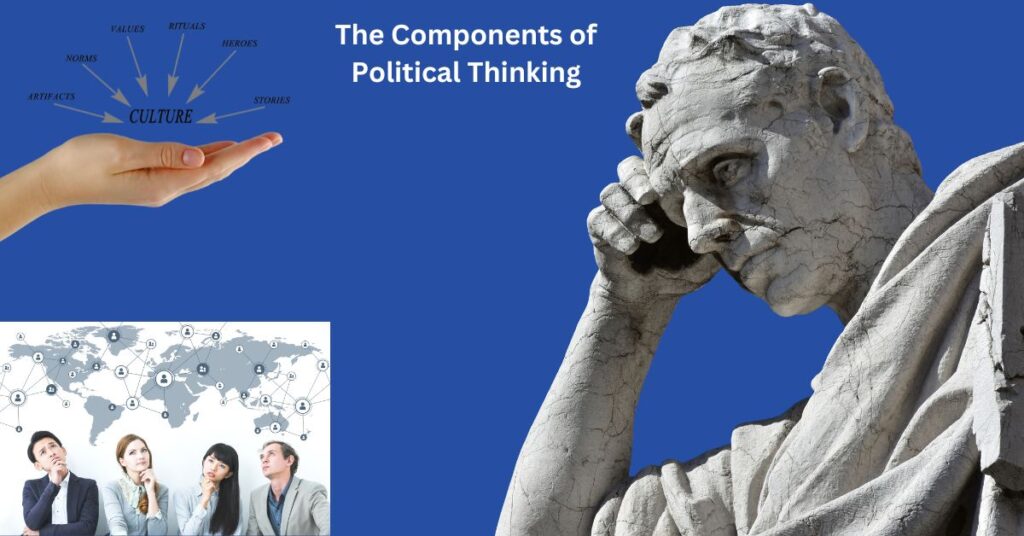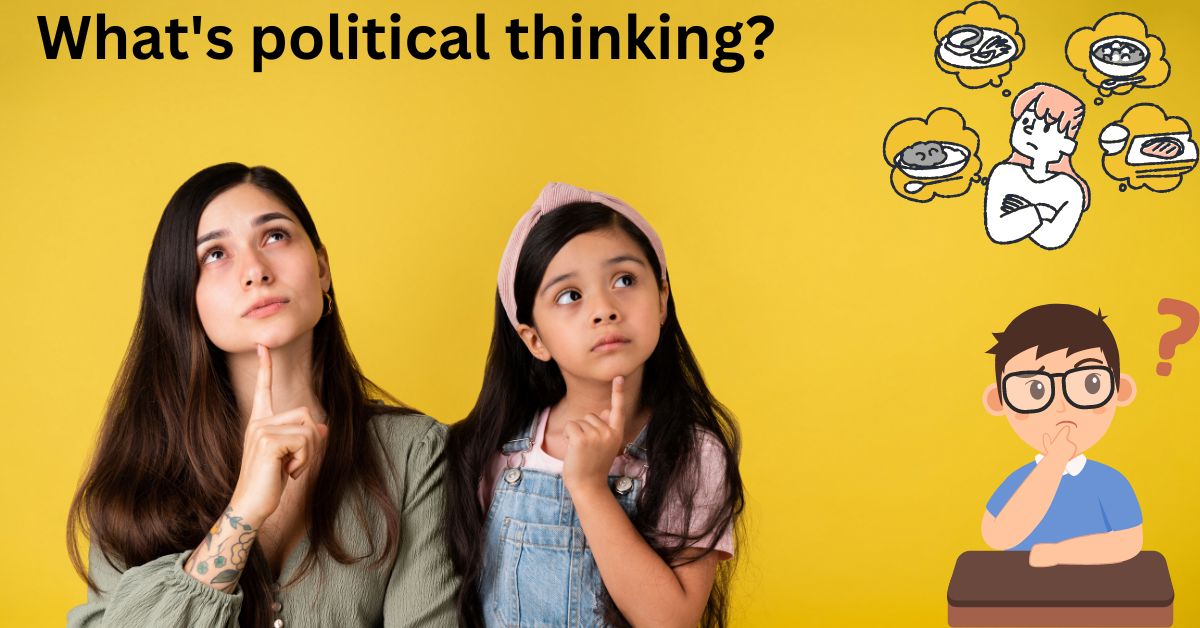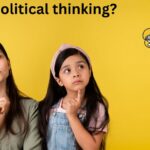Political thinking includes the basic examination, assessment, and detailing of thoughts concerning legislative issues, administration, control flow, and societal organization. It includes a profound engagement with concepts such as equity, rights, specialist, freedom, balance, and the part of government in forming social orders.
Political thinking goes past insignificant conclusion or belief system; it requires thorough examination of chronicled settings, hypothetical systems, observational prove, and moral contemplations. By investigating these measurements, people can way better get it and contribute to talks approximately how social orders ought to be organized, what arrangements are fair and successful, and how control ought to be conveyed and controlled inside a community or country.
In this way, political considering serves as a establishment for educated citizenship, policy-making, and the interest of a fair and impartial society.
What is Political Thinking?
Key Elements of Political Thinking:
Critical Analysis: Political thinking includes the capability to severely examine statistics, arguments, and rules. It requires inspecting specific perspectives, thinking assumptions, and evaluating proof to form reasoned judgments.
Understanding Political Concepts: This consists of knowledge essential political principles along with electricity, authority, justice, liberty, equality, democracy, and sovereignty. Political thinkers explore how those standards are described, interpreted, and applied in different contexts.
Political Ideologies: Political wondering entails reading exclusive ideologies including liberalism, conservatism, socialism, feminism, environmentalism, and so on. It requires know-how their middle ideas, values, and implications for governance and society.
Political Frameworks and Educate: Political scholars look at various political structures (vote based system, dictatorship, totalitarianism, and so forward.) and educate (governing body, govt, legal, and numerous others.). They watch how the ones frameworks perform, their qualities, shortcomings, and their affect on administration and open scope.
Policy Analysis: Political wondering includes studying public regulations and their consequences on society. This involves assessing coverage goals, implementation techniques, consequences, and implications for one of a kind stakeholders.
Historical Perspective: Understanding political thinking regularly includes studying political history and how thoughts and moves have advanced over time. This historic perspective facilitates in contextualizing modern-day political debates and traits.
Ethical and Normative Considerations: Political thinking explores ethical and normative problems together with human rights, social justice, and the position of government in addressing societal troubles. It involves comparing regulations and decisions based totally on moral concepts and values.
Global and Comparative Analysis: Political thinking also includes inspecting politics on a worldwide scale and making comparisons throughout exceptional nations and areas. This comparative method helps in know-how the variety of political systems and practices.
Importance of Political Thinking:
Informed Citizenship: Political wondering fosters informed citizenship via equipping people with the information and abilities to apprehend complicated political troubles, make informed choices, and participate effectively in democratic tactics.
Policy Development: It contributes to the improvement of sound public regulations by using selling rigorous analysis, evidence-primarily based reasoning, and consideration of various views.
Democratic Governance: Political wondering supports the concepts of democratic governance by encouraging debate, communicate, and the alternate of thoughts amongst residents, policymakers, and political leaders.
Critical Engagement: It encourages critical engagement with energy structures and political institutions, promoting accountability, transparency, and the safety of democratic values.
The Components of Political Thinking

Political Knowledge and Awareness:
This component refers back to the know-how of basic political records, institutions, techniques, and modern occasions. It consists of expertise of governmental systems, political parties, electoral systems, and fundamental coverage problems. Political understanding is essential for informed choice-making and powerful participation in political sports.
Political Values and Beliefs:
Political values are deeply held principles and beliefs about what is proper, simply, and vital in society. They often have an impact on people’ attitudes in the direction of particular guidelines or political actors. Examples consist of liberty, equality, justice, and individual rights. Political ideals are convictions or critiques approximately how the political machine ought to perform and what rules must be applied.
Political Ideologies:
Ideologies are comprehensive units of political views and values that provide a framework for know-how politics and guiding political motion. Common ideologies include liberalism, conservatism, socialism, and fascism. Ideologies offer coherence and direction to political thinking by means of imparting interpretations of the function of presidency, financial systems, social justice, and person rights.
Political Attitudes and Opinions:
Political attitudes are people’ predispositions or orientations toward particular political objects, along with policies, political parties, or government establishments. These attitudes may be favorable or damaging and affect conduct, inclusive of vote casting or political activism. Political critiques are expressed critiques or judgments approximately political troubles, occasions, or actors primarily based on personal values, ideals, and information.
Political Socialization:
This aspect refers to the manner via which people collect their political values, beliefs, attitudes, and behaviors. It occurs all through one’s existence and entails numerous marketers including own family, friends, education, media, and societal institutions. Political socialization shapes how people understand and interact with political matters and can influence their political identities and affiliations.
Critical Thinking and Analysis:
Political thinking additionally includes the ability to seriously analyze and examine political statistics, arguments, and guidelines. Critical wondering competencies permit people to evaluate the validity, reliability, and implications of political claims and to make reasoned judgments. This factor is vital for distinguishing among reality and opinion, knowledge biases, and making knowledgeable political decisions.
Political Behavior and Participation:
Finally, political questioning encompasses actions and behaviors related to political participation, together with voting, advocacy, protest, and network engagement. It involves translating political attitudes and opinions into concrete movements which can have an effect on political consequences and regulations.
Developing Political Thinking Skills
Understanding Political Systems: Start via gaining knowledge of about different political systems (democracy, socialism, and so forth.) and how they function. This consists of information key concepts like governance, power systems, and political participation.
Studying Political History: Familiarize your self with ancient activities and their political contexts. This helps in knowledge how political selections and moves have shaped societies and guidelines over the years.
Analyzing Political Ideologies: Explore various political ideologies (liberalism, conservatism, feminism, and many others.) and understand their standards, values, and implications. Compare and evaluation these ideologies to understand their strengths, weaknesses, and actual-international applications.
Critical Thinking: Develop important wondering abilities to evaluate political records seriously. This consists of questioning sources, examining biases, and know-how the results of political movements and guidelines.
Engaging with Current Affairs: Stay updated on cutting-edge activities and political traits regionally, nationally, and globally. Analyze information from multiple resources to get a properly-rounded angle on issues.
Debating and Discussion: Engage in discussions and debates with others who’ve diverse viewpoints. This helps in sprucing your arguments, considering different perspectives, and know-how the complexity of political troubles.
Research and Fact-Checking: Practice learning political subjects thoroughly the usage of credible assets. Fact-checking is critical in a international in which misinformation and disinformation can skew perceptions.
Empathy and Understanding: Develop empathy in the direction of extraordinary political viewpoints and keep in mind how rules and selections impact various companies in society. This helps in forming more knowledgeable and compassionate political critiques.
Participation: Get concerned in political sports together with volunteering, joining advocacy businesses, or maybe running for student government. Practical experience can deepen your knowledge of political methods and challenges.
Ethics and Values: Reflect for your own moral concepts and values as they relate to politics. Understanding your very own beliefs can help you navigate complex political issues extra correctly.
Continual Learning: Political landscapes evolve, so it is essential to keep studying and adapting your questioning through the years. This may also involve analyzing books, attending lectures, or taking publications on political science or related subjects.
The Future of Political Thinking

Technology and Information: The speedy advancement of era, specially AI and large information analytics, will maintain to persuade how political selections are made and how data is disseminated. This should result in extra personalized political messaging and focused campaigns, in addition to demanding situations related to incorrect information and privateness.
Globalization: The interconnectedness of economies and societies across borders means that political issues increasingly have international dimensions. Issues like climate alternate, migration, and alternate require collaborative, international solutions, which may additionally impact how political leaders and thinkers method governance.
Demographic Shifts: Changing demographics, including getting old populations in a few areas and youth bulges in others, will form political priorities and rules. Generational differences in values and expectations might also cause shifts in political ideologies and voting styles.
Environmental Challenges: The developing awareness of environmental troubles which include climate exchange is probably to influence political thinking, main to more emphasis on sustainability and regulations geared toward mitigating environmental degradation.
Social Movements and Activism: The upward push of social moves advocating for various reasons (e.G., racial justice, gender equality, LGBTQ rights) is reshaping political discourse and pushing for coverage modifications. These movements often use digital structures to mobilize guide and have an effect on public opinion.
Political Polarization: Many international locations are experiencing expanded political polarization, where differences in ideology and values are getting more reported. This fashion could result in extra fragmented political landscapes and challenges in accomplishing consensus on essential issues.
Governance Models: There is ongoing debate approximately the effectiveness of various governance fashions (e.G., democracy, authoritarianism) in addressing cutting-edge challenges. The future of political wondering may involve experimenting with new forms of governance or adapting current fashions to better reply to societal desires.
Economic Inequality: Persistent financial inequality inside and among international locations remains a vital issue. Addressing disparities in wealth and opportunity will in all likelihood be a imperative subject for destiny political thinkers and policymakers.
Table
| Aspect | Description |
|---|---|
| Definition | Critical examination and evaluation of political concepts, theories, systems, and behaviors. |
| Purpose | To understand political phenomena, form opinions, make decisions, and participate effectively in political processes. |
| Elements | Includes political theories (e.g., liberalism, socialism), ideologies (e.g., conservatism, feminism), institutions (e.g., government, judiciary), and policies. |
| Skills | Critical thinking, analysis, synthesis, evaluation of evidence, understanding of historical context, awareness of power dynamics. |
| Methods | Research, debate, discourse analysis, comparative analysis, policy analysis, historical analysis, philosophical inquiry. |
| Importance | Empowers citizens to make informed voting decisions, contributes to policy development, enhances civic engagement, promotes accountability in governance. |
| Challenges | Bias, misinformation, complexity of political systems, conflicting ideologies, polarization, ethical dilemmas. |
| Examples | Critically examining the impact of economic policies on social equality, evaluating the effectiveness of electoral systems, analyzing the role of media in shaping public opinion. |
FAQS
What does political thinking contain?
Political wondering includes inspecting political theories, ideologies, policies, and their implications. It requires expertise how energy is sent, how decisions are made, and the effect of political movements on individuals and societies.
Why is political questioning important?
Political wondering is crucial for informed citizenship and effective governance. It enables individuals to assess the validity of political claims, recognize complicated troubles, and participate meaningfully in political approaches inclusive of vote casting and activism.
How does political thinking fluctuate from political ideology?
Political thinking is a broader concept that encompasses the important analysis and assessment of political ideas and systems. It involves thinking assumptions, analyzing proof, and considering exclusive views. In contrast, political ideology refers to a set of beliefs or concepts that manual political motion and policy possibilities.
What skills are worried in political wondering?
Political thinking calls for competencies inclusive of crucial evaluation, logical reasoning, statistics evaluation, and the capacity to don’t forget more than one viewpoints. It also entails expertise political records, institutions, and the socio-financial context in which political choices are made.
How can a person enhance their political wondering?
Improving political thinking entails staying informed approximately modern-day activities, studying political principle and history, engaging in discussions with others protecting numerous viewpoints, and severely evaluating assets of statistics. Developing a dependancy of wondering assumptions and inspecting proof strengthens one’s ability to suppose seriously approximately politics.
conclusion
Political thinking alludes to the prepare of fundamentally analyzing and assessing political thoughts, approaches, frameworks, and teach. It includes understanding how control is dispersed and worked out inside social orders, as well as the affect of political choices on people, communities, and nations.
In conclusion, political thinking is fundamental for educated citizenship and compelling administration. It makes a difference people survey the legitimacy of political contentions, make educated choices in decisions, and advocate for approaches that adjust with their values and interface. By locks in in political considering, individuals contribute to the equitable prepare and advance the headway of social orders towards more fair and evenhanded results.










